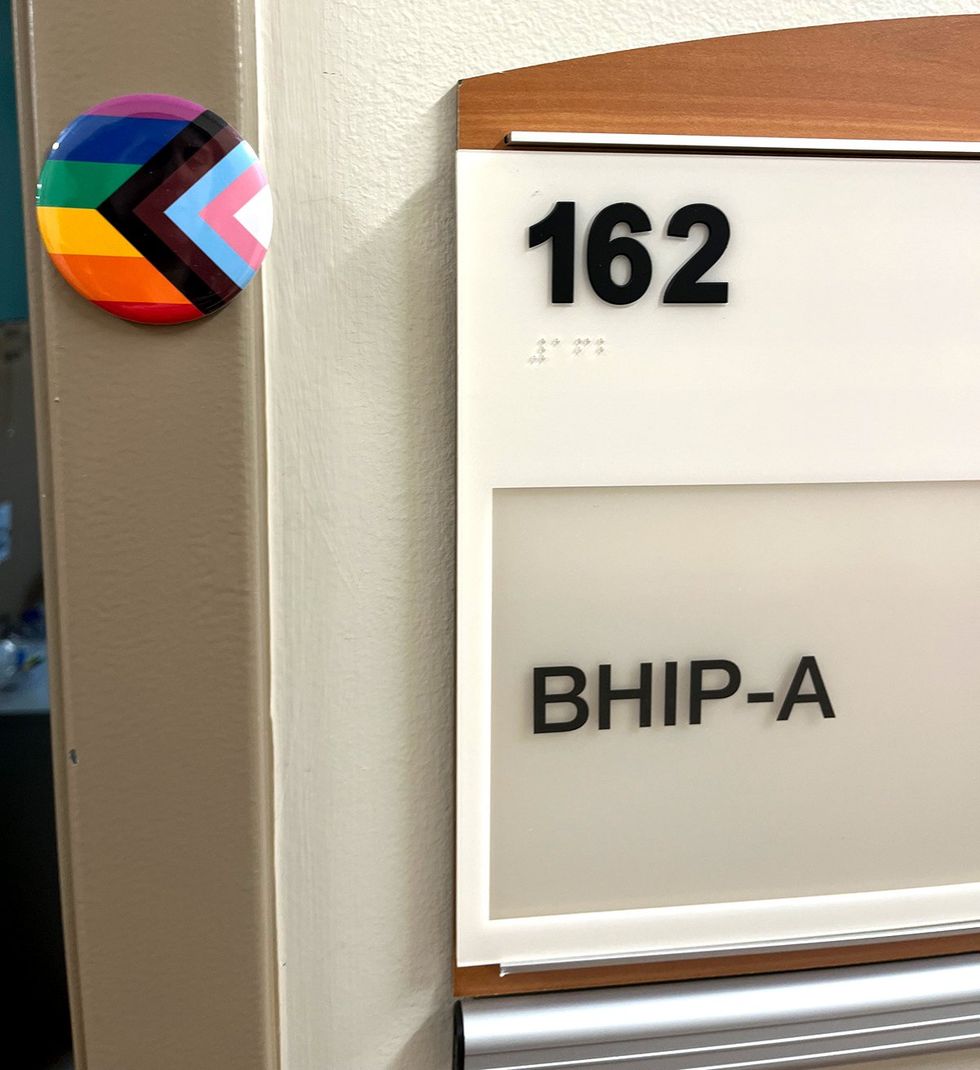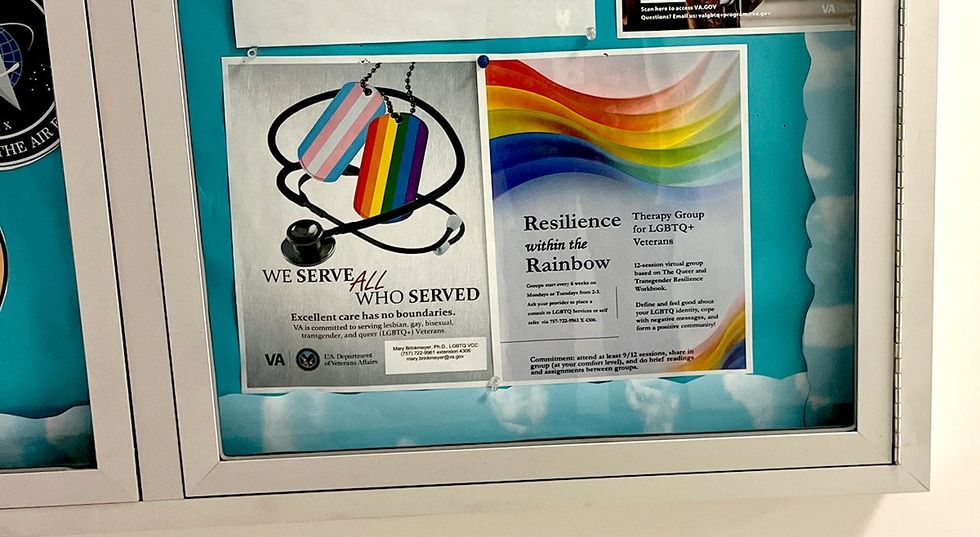A Virginia psychologist who coordinated care for transgender, nonbinary, and other LGBTQ+ veterans at the Hampton VA Medical Center, has resigned in protest, calling the agency’s recent directives on LGBTQ+ health care “unethical.”
Keep up with the latest in LGBTQ+ news and politics. Sign up for The Advocate's email newsletter.
Her decision follows a sweeping executive order issued by President Donald Trump that effectively eliminates federal recognition of transgender and nonbinary identities in government programs, including at the Department of Veterans Affairs. The order, signed January 20, is titled “Defending Women From Gender Ideology Extremism and Restoring Biological Truth to the Federal Government.” It mandates that all federal agencies define gender as strictly male or female based on assigned sex at birth, bars funding for gender-affirming care, and orders the removal of policies recognizing gender identity. For Brinkmeyer, this posed an unacceptable ethical dilemma.
Related: Donald Trump’s government declares that transgender and nonbinary people don’t exist
“I could not, in good conscience, continue to work in an environment that was actively stripping away affirming care for veterans who need it most,” Dr. Mary Brinkmeyer told The Advocate in an interview. “As clinicians, we have an ethical duty to do no harm, and what’s happening now is the opposite of that.”
 Mary Brinkmeyer’s former office.Courtesy Mary Brinkmeyer
Mary Brinkmeyer’s former office.Courtesy Mary Brinkmeyer
A system in crisis
Brinkmeyer, a licensed psychologist since 2008, joined the Hampton VA in June 2022 as the LGBTQ+ veteran care coordinator and behavioral health interdisciplinary program psychology program manager. Most major regional facilities have such a position. She says she oversaw care for an estimated 300 to 400 transgender veterans at the facility.
After Trump’s executive order, the VA announced a 120-day review period to assess its impact, Brinkmeyer says. But, according to her, changes were already being implemented behind the scenes, leaving veterans and providers scrambling for clarity.
Related: Donald Trump signs new executive order affecting transgender military members
“The VA put out a statement saying things should stay the same during the review period, but that’s not what’s happening,” Brinkmeyer said. “Staff were told to start identifying anything in medical records, training materials, or patient resources that could be considered ‘gender ideology.’” Some VA facilities, she added, were even questioning whether they could conduct evaluations for gender-affirming surgery.
Though gender-affirming care remains technically available, Brinkmeyer worries the administration’s intent is clear. “Transgender patients are terrified of losing their medical care,” she said. “Many rely entirely on the VA and don’t have alternative options.”
Erasing LGBTQ+ presence at VA facilities
Brinkmeyer reached her breaking point when she says the Hampton VA administration ordered the removal of all LGBTQ+ affirming materials from public and private spaces. “Without consulting me, the director of my mental health department ordered that every single gender-affirming sign, poster, flyer, and brochure be taken down,” she said. “That included banners we had obtained through grant funding to create a welcoming space for LGBTQ+ veterans.”
She says that the policy extended to clinicians’ private offices, with some staff reporting their offices were inspected to ensure compliance. “We had safety signal magnets, ‘VA serves all who served’ signs — everything was stripped away,” Brinkmeyer said. “It sent a clear message to LGBTQ+ veterans that they are no longer welcome.”
Resignation over ethical concerns
As a supervisor, Brinkmeyer was expected to enforce these new restrictions. Instead, she refused. “I would not tell anyone to take things out of their offices,” she said. “I refused to remove anything from mine. They took my magnet off my door, and I put it right back up.”
Brinkmeyer confronted her supervisor about the removal orders, insisting they were unethical and harmful to veterans and staff. “In our morning supervisor huddle, I said, ‘For the record, this shouldn’t have happened, and I’m not taking anything out of my office. I’m not telling anyone to remove anything from theirs. If someone wants me to take something down, they need to put it in writing so I can refuse in writing.’” She later met with the director, who, despite listening to her concerns, ultimately dismissed them, stating that she “tends to follow orders whether she agrees with them or not unless they cause harm.” Brinkmeyer firmly disagreed, arguing that the damage was already evident. “By Friday, veterans had already heard about what was happening, and one of my patients asked me directly why the VA was doing this,” she said.
 LGBTQ supportive fliers in display caseCourtesy Mary Brinkmeyer
LGBTQ supportive fliers in display caseCourtesy Mary Brinkmeyer
After seeing firsthand the distress the changes were causing among colleagues and veterans, Brinkmeyer decided she could no longer stay. “I was in disbelief that this was happening, and when I raised concerns, I felt they were minimized or ignored,” she said. “I didn’t want to be complicit in something that I knew was wrong.”
Her last day at the Hampton VA was February 12. As a member of the LGBTQ+ community, she says that after the election, she had initially planned to transition into another job in May but moved up her departure after the directives were enforced. She will soon begin work at an affirming private practice.
Brinkmeyer’s resignation comes as the Trump administration escalates its attacks on transgender rights across federal agencies. Over the weekend, a court filing revealed that the Department of Defense doesn’t even track service members by gender identity—yet the administration is pushing ahead with policies banning trans troops from serving. Meanwhile, the Air Force issued a memo urging transgender service members to voluntarily separate by March 26 or face an uncertain future, marking yet another step in the systematic erasure of trans people from federal institutions.
The chilling effect on care
Brinkmeyer said VA clinicians are deeply unsettled. “Some were mistakenly told they couldn’t even ask veterans about their sexual orientation or gender identity,” she said. “That’s not true, but when broad directives come down, people get scared and self-censor.”
Related: Trump signs executive order banning federal support of gender-affirming care for anyone under 19
Brinkmeyer also expressed deep concern for her interns, who were in the midst of their LGBTQ+ rotations. “I had created this LGBTQ+ rotation for interns and one for our practicum students. I had planned to get my interns through their rotations, but the way things unfolded, I had to leave earlier than expected,” she said. “It was heartbreaking knowing they were going to be left without the guidance and training they signed up for.”
Related: Trump administration admits to judge it doesn’t know how many troops are trans—or why it’s banning them
She urges providers to keep serving veterans as best they can. “Don’t ask permission — just keep doing what you know is right until you’re told otherwise, and if you are told otherwise, get it in writing,” she advised. “What happens in the therapy room is between you and your veteran.”
LGBTQ+ veterans left in limbo
Brinkmeyer fears what will happen when the VA’s review period ends. “At first, we reassured patients that gender-affirming care wouldn’t be taken away because there were directives protecting it,” she said. “But now it seems like directives don’t matter. I feel like I gave people false reassurance.”
According to the websites for several VA hospitals, gender-affirming care and access to LGBTQ+ care coordinators is still available. Representatives for the Department of Veterans Affairs and the Veterans Health Administration, the VA hospital system, did not respond to The Advocate’s requests for comment.
Related: Trump administration says trans service members have until March 26 to quit Air Force
Brinkmeyer has encouraged veterans to establish contingency plans by seeking care through Planned Parenthood, online providers, or other community-based clinics. “There’s going to be a rush on these services if the VA eliminates gender-affirming care,” she warned.
According to government pamphlets, the VA has historically provided a wide range of gender-affirming care, including hormone therapy, speech therapy, prosthetics such as chest binders and breast forms, fertility preservation, medically necessary hair removal, mental health services, and letters of support for surgery. The department has also assisted with name and gender marker changes in medical records and provided carry letters for transgender veterans.
With that support now under threat, Brinkmeyer wants LGBTQ+ veterans to know they are not alone. “Despite what it looks like on the outside, most clinicians at the VA still value and support you,” she said. “Seek out those who will affirm you.”


 Mary Brinkmeyer’s former office.Courtesy Mary Brinkmeyer
Mary Brinkmeyer’s former office.Courtesy Mary Brinkmeyer LGBTQ supportive fliers in display caseCourtesy Mary Brinkmeyer
LGBTQ supportive fliers in display caseCourtesy Mary Brinkmeyer


































































Charlie Kirk DID say stoning gay people was the 'perfect law' — and these other heinous quotes